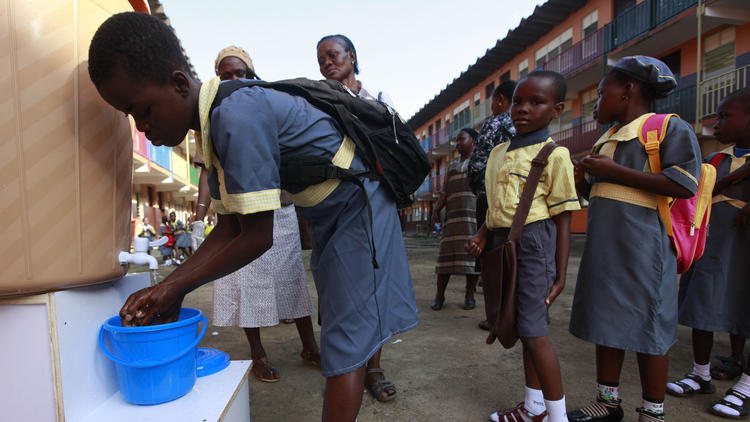Ebola in Pop Culture: Time to Rip off the Band Aid
Written by: Kirsten Aleksejev
Edited by: Dani Lau
Nearly a year after the World Health Organization (WHO) first announced the outbreak of Ebola hemorrhagic fever in the small country of Guinea on March 25, 2014, Sir Bob Geldof released his new rendition of Band Aid’s “Do They Know It’s Christmas”.
Geldof claimed that the new holiday single is essential to raising awareness about the disease which has claimed more than 6,300 lives, the majority of which were lost in West Africa. Like its 1984 namesake, Band Aid 30 once again features famous UK celebrities including the likes of Ed Sheeran, Ellie Goulding, and Harry Styles singing out against the tribulations of living in Africa, and questioning whether Africans realize it’s Christmas. Again, predominantly white, western artists call upon a predominantly white, western audience to donate to this year’s cause-du-jour: the Ebola outbreak.
And this is where local initiatives raising funds for Ebola are unfortunately being eclipsed by Geldof’s Band Aid. In fact, West Africans produced their own song, Africa Stop Ebola, which features a team of artists including Ivorian reggae artist Tiken Jah Fakoly, and Malian duo, Amadou & Mariam. There are a few striking differences between the music videos that produce sharply contrasting images of Africa. For one, Band Aid’s Africa is a homogenous continent full of victims where there is “death in every tear,” while Fakoly and team’s Africa is self-sufficient, peppered with people helping each other by depending on one another for help in controlling the spread of Ebola.
When the lyrics are divorced from their euphonic melodies, one can see the discrepancy between the messages of the two songs. While one song actually tells us about the importance of trusting doctors, and how to prevent disease by washing our hands, etc., the other warns us that the world is full of death and fear, and that kisses from loved ones can be fatal. The former offers an objective and educational experience to the listener, while the latter is noticeably absent of anything that can be construed as constructive. The Band Aid single creates a fictitious wound, presenting Africa as a frightening place that we should heroically throw aid at, and not as a dynamic continent that has made substantial progress in combating infectious disease. Band Aid overshadows African resourcefulness and self-sufficiency. Take Nigeria’s success story in battling disease for example – they barely needed any outside intervention to control and eliminate the Ebola outbreak in Lagos.

Children in Lagos, Nigeria, wash their hands with soap after being tested for signs of the Ebola virus on 08/10/2014 (Sunday Alamba / Associated Press)
Instead of simply being a recycled song with new lyrics, Africa Stop Ebola is fresh, spotlighting home-grown artists who use their musical platform to educate us. Singing English, French and West African languages such as Malinke, Soussou, and Lingala, these artists bridge the gap between the West and Africa. This multilingual approach helps educate a variety of listeners, as well as helps build community for those affected by Ebola. Not only that, but all profits raised by Africa Stop Ebola go to Médecins Sans Frontières.
Of course, Geldof’s intention to raise money for Ebola with a resurrected Christmas carol is not malicious. After all, 34% of all charity donations are given after September, with December accounting for nearly 20% of these donations. But let’s be real, Band Aid’s title, Do They Know It’s Christmas, is a bit insulting. With the exception of northern Muslim populations, West Africans are predominantly Christian – they know what and when Christmas is.
Let’s not let Band Aid’s song be the single narration of the Ebola crisis that we hear this holiday season. It is important to be critical of projects like Band Aid, which reinforce a stereotypical image of Africa as being perpetually in need of aid. Instead, we should tip our hats to the home-grown heroes of Africa Stop Ebola, who share lyrics that go beyond teardrops of death. Perhaps if we rip off the Band-Aid once and for all, and let Africans address issues the way they feel is appropriate, we might all hear a catchier Christmas tune.

Recent Comments
Friday, 09 Jan, 2015
Awesome piece of article!
Comments are closed.